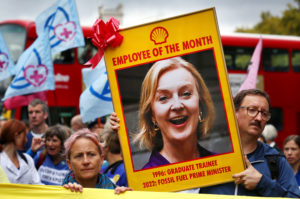Even in the most tense, fractious relationship there can be enormous capacity for calm: for letting things go, for tolerating each infraction for the greater good, for simply getting on with things. Eventually, though, the dam breaks into a cathartic spasm of anger and it all unravels. Buried resentments unearth themselves and heighten every complaint. Suddenly, everything is a battle, from the thing they did that one time to why they must stir their tea so BLOODY LOUDLY.
Outside Downing Street yesterday, it took Liz Truss just a few minutes to call time on her condensed premiership. But the Conservative Party’s spasm of anger had already erupted. On Wednesday, decades of brewing feuds, petty grievances and polite disagreements exploded into a contraction of chaos. In a few short hours, the Government saw the Home Secretary depart office, scuffles erupt in the lobby, and confusion reign over whether the Chief Whip had resigned or not. Tory MPs began to openly lament the state of the party. Within 24 hours the Prime Minister would fall, the shortest tenure in British history.
It was a dramatic spectacle for the Lobby to feed on and a day and a half of despair for Liz Truss. It was not, however, an unheralded implosion, but rather the culmination of shifting party dynamics over the last few decades. Cameron’s attempt at detoxification, the gamble of the referendum, and the squabbles over Brexit each played a role in pushing to this moment — as did a thousand snubs, slights and overpromotions. This mess took only a few hours to unfold, but it was years in the making.
The Conservative Party has always been an uneasy alliance of unlikely figures. Driven more by the desire to govern than ideology, the party attracts confused and conflicting views and rebrands the resulting contradictions as a “broad church”. Passing electoral trends add new layers onto this, embedding fault lines. The party rubs along reasonably well by focusing on its one shared goal: winning elections. When the possibility of this diminishes, as with a precipitous dip in the polls, the fault lines start to crack. In a land of first-past-the-post, the Right’s broad coalition works. Until it doesn’t.
The current party is perhaps more riven by these divisions than ever in its history. They have been compounded by recent political divisions and the polarisation which occurred within the House and the public at large. With a weak prime minister and the prospect of electoral oblivion, the scene was set for a quake.
It is tempting to see the split in the Tory party as binary — a matter of Wet vs Dry, of economic liberalism versus a more mid-century paternalism. Yet very few in the party neatly fit this spectrum. In fact, the various Westminster tribes are often a bizarre and competing mix of each. The Thatcherites would usually happily throw state money at their pet projects and would rarely abandon their staunchest supporters to the whims of the market. There’s no real movement in the party to expose farmers to cheaper imports from abroad, for example, and there are many who would free every market but the movement of people.
In the same vein, the Left of the party did little to reject austerity and now pushes for its return, at least where it didn’t impinge on their voters. Benefits and schools seem easier for them to cut than pensions and bin collections. For most, the real north star is whatever motivates the voters and principles often come second to vibe.
Part of the reason for the party’s multi-decade battles over Europe is that it was the only issue that forced them into a binary choice. There was no real nuance when it came to Remain or Leave: it was a simple question with a single answer. This challenged the ability to be all things to all men and forced them to nail their colours to the mast. It also served to cut every faction in two.
Brexit applied a new lens to every internal debate. Leave MPs who pushed for protectionism and an anti-immigration stance suddenly became Dries, while the One Nation tag seemed to stick to Cameroons who had no issues with austerity but largely voted Remain. Moreover, this dividing line became baked into the party machine. While some MPs, most notably Truss, wore their affiliation lightly and skipped from one side to the other, the rest decided to dig in. It no longer mattered if you were a Singapore-on-Thames libertarian or a faith-and-flag protectionist, you shared an enemy. Outside of parliament, too, the members generally saw their new identity and took to it as partisans.
The conduct of the parliamentary party and respective governments in the aftermath of the referendum made this worse. Theresa May’s ministry failed to either placate or nullify the hard-line Brexiteers, giving them enough space to undermine her attempts to reach a settlement with the EU. Repeated cabinet resignations, rebellions, and plots to oust her aggravated those who supported Remain, while her compromises with the EU angered the ERG and allies.
Seeing the difficulties May had fallen into, Johnson had a direct plan of confrontation with his internal opponents. In an early act of his premiership, he withdrew the whip from those who defied him on Brexit. These were Remainers, but there was also an implicit threat to those on the Right, which ultimately got his deal across the line. From then on, he rewarded loyalty with promotions and treason with political exile — there was no room for conciliation or meritocracy. This, naturally, angered his internal opponents, but he held one trump card, his popularity with the electorate. When that wobbled, there was no shortage of volunteers to act against him.
Whoever became leader after him was due to inherit a soured atmosphere. That Truss edged through with only a third of MPs supporting her did not bode well. In appointing a Cabinet of loyalists, she exacerbated this anger and put a huge wager on things going well. It didn’t. When her mini-budget imploded, and took Tory poll ratings to new lows, her authority sank. The one thing that brought Tories together and kept them civil, winning elections, was gone.
This set the scene for a rapid unravelling. When your polling goes that low, there is a swathe of people who know they have nothing to lose. Their seat will be gone whether they have the whip or not. Equally, all sides think that tacking their way is the solution, and ambitious seniors see it as their chance to audition for the top seat. The clouds gather, and every issue becomes a lightning rod.
When the party is at peace, the nebulous nature of factions makes it easier to manage. People can be nudged into line because they aren’t that wedded to one ideological strain. When it is in free-fall, it makes everyone a potential enemy. That’s why the government picking an argument over fracking was such a terrible idea. The enviro-wets might be already against you, but so too are the MPs who don’t want hydraulic drilling under their constituency. There aren’t enough diehard growthers who will put ugly scenes in their backyard into second place, and seeing you are weak gives other malcontents an opportunity.
In these times you need iron parliamentary discipline, and with a weak leader that is almost impossible to maintain. You end up daring people to defy you, and, on finding they do, you end up in the confusion of whipping and unwhipping a vote. This is embarrassing and intolerable for the people you ask to do it, so you end up losing them too.
At a Cabinet level too, things become impossible to manage. With the arrival of Hunt, the people who were excluded under Boris found their way back to the table. This brought on both a personal and political fight against those they see as the under-talented beneficiaries of largesse. Suella Braverman was the standard bearer — unashamedly populist on immigration (an issue that socially liberal Tories feel relaxed on, economic liberals are enthusiastically in favour of, but others are firmly against), and widely regarded by the “sensibles” as swivel-eyed. An errant email gave the chance to boot her out, but it was fractious politics that motivated taking it.
Truss had become despised by almost everyone, for betraying her Cameroon origins to embrace a hard Brexit, and then acquiescing to a quiet coup from the other side. She tried and she failed with her own mandate, and then became unable to maintain authority after she abandoned it. In doing so she reaped the outcome of the divisions and slights that had bubbled under the surface for decades. A deft politician with a gift for deal-making and communication might have steered through these waters. Liz Truss was not that person. She flipped and flopped on her main policies, but failed to offer the one thing every Tory craves most: the prospect of continuing in government.
Now, there is no clear pretender, because the other factions are so riven and built on shaky ground. It is hard to see someone who can unite the parliamentary party, let alone the membership. In a week we will see who emerges, then question whether they can make the most of it or not. Each of the major names is tainted by some association or another, each unwelcome in certain corners of the party and with their own personal challenges. There will be seven days of deal-making, but they will inherit the burden of a party happy to fight itself.
The only question now is whether the ugly infighting continues in public. Some relationships blow up once and come to a swift and dignified end, others paper over the cracks and rumble on a while longer. But the worst become toxic in their daily antagonisms. The Tories may try to pull themselves together, to have a quiet Christmas for the sake of the nation, but with authority and cohesion broken, it is unclear how this will happen, even now Truss has gone.
Disclaimer
Some of the posts we share are controversial and we do not necessarily agree with them in the whole extend. Sometimes we agree with the content or part of it but we do not agree with the narration or language. Nevertheless we find them somehow interesting, valuable and/or informative or we share them, because we strongly believe in freedom of speech, free press and journalism. We strongly encourage you to have a critical approach to all the content, do your own research and analysis to build your own opinion.
We would be glad to have your feedback.
Source: UnHerd Read the original article here: https://unherd.com/




